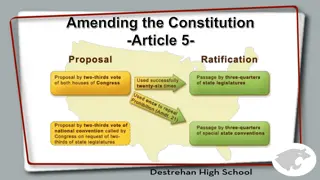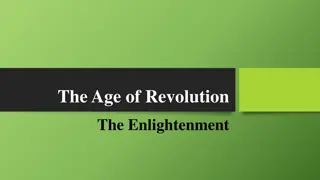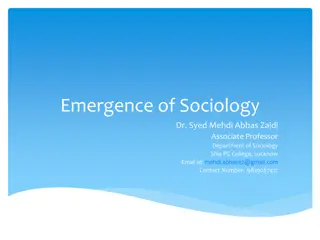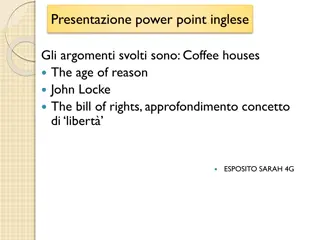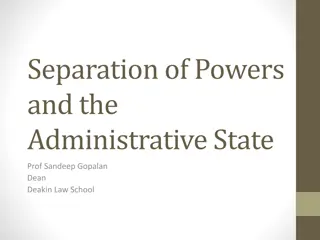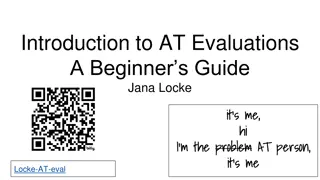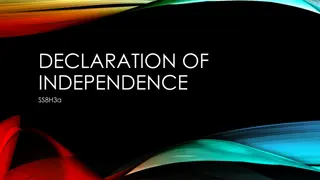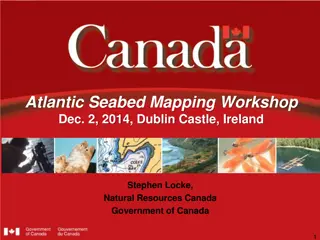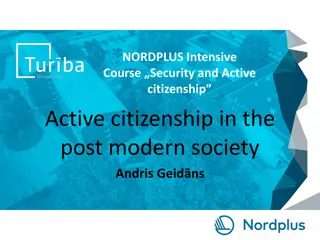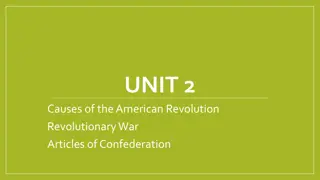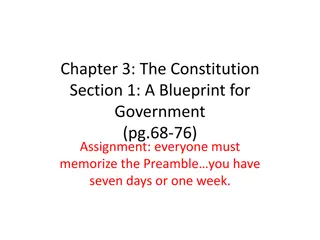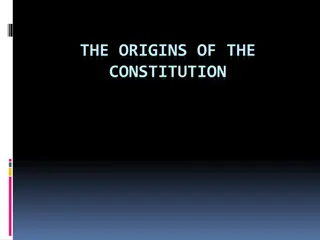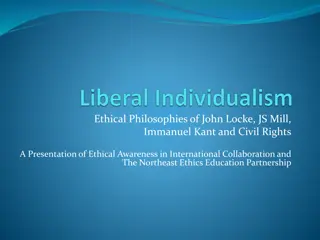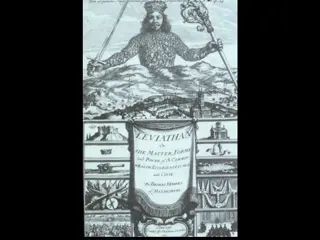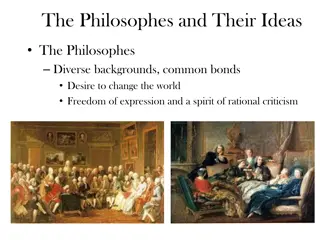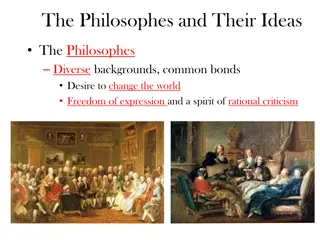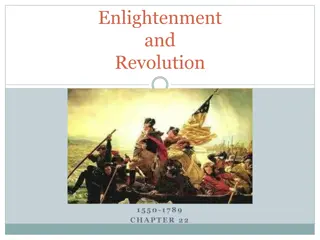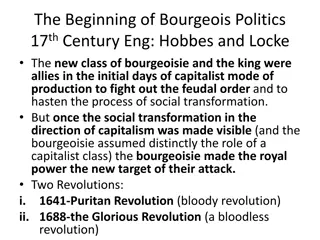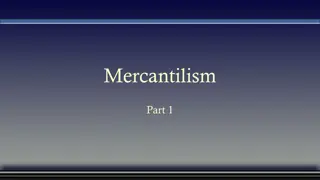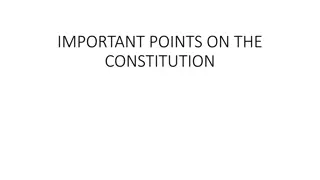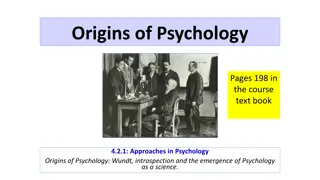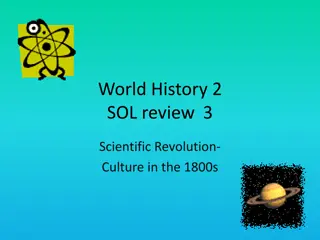Compare & Contrast
Similarities and differences in the ideologies of Thomas Hobbes and John Locke, focusing on their views on the state of nature, social contract, and forms of government.
4 views • 8 slides
Austen in Theory
The housekeeping information for the Austen in Theory course, including paper deadlines and prompt details. Students will explore Austen's novels in relation to philosophers such as Locke, Hume, Smith, Burke, or Wollstonecraft.
1 views • 28 slides
Liberty & The Age of Enlightenment The American Battlefield Trust
The Age of Enlightenment, with its emphasis on natural law, liberty, progress, and constitutional government, greatly influenced American thinking and the Revolutionary War. Key figures like John Locke and Sir William Blackstone contributed ideas of social contract and law that shaped American gover
2 views • 15 slides
Origins of Government Power in the United States
The U.S. government derives its power from the consent of the governed, reflecting principles of popular sovereignty, general will, and majority rule. Philosophers like Hobbes, Locke, and Rousseau have influenced the concept of government's legitimacy through the consent of the people. The evolution
0 views • 13 slides
Enlightenment Thinkers and Their Ideals
The Age of Revolution was marked by influential Enlightenment thinkers such as Thomas Hobbes, John Locke, Montesquieu, and Jean-Jacques Rousseau. These philosophers explored human nature, government, and society, shaping modern political thought. Hobbes emphasized a pessimistic view, advocating for
2 views • 9 slides
Understanding the Basic Concept of Human Rights in Modern Jurisprudence
Human rights are natural and inalienable, essential for human life, based on universal principles. The concept of human rights is both simple and complex, requiring societal development and political will for implementation. Rooted in natural law theory, human rights have evolved from natural law to
1 views • 24 slides
The Emergence of Sociology: A Historical Overview
Sociology, derived from Latin and Greek roots, has evolved over centuries through various stages, influenced by social, economic, and political factors. Key thinkers like Plato, Aristotle, Hobbes, Locke, Rousseau, Montesquieu, Comte, Durkheim, and Marx have shaped the discipline. The Industrial Revo
1 views • 23 slides
The Cultural Evolution from Coffee Houses to the Internet in the Age of Reason
The presentation explores the transition from coffee houses as hubs of intellectual exchange to the internet for accessing news and discussions. It delves into the Age of Reason, discussing figures like John Locke and the concepts of civility, moderation, and the role of women in cultural life.
0 views • 13 slides
Principles of Separation of Powers in the Administrative State
Understanding the principles of separation of powers - including the separation of functions, division of power, checks and balances, bicameralism, and federalism - is crucial in maintaining a system where governmental entities coexist harmoniously while preventing the concentration of political pow
0 views • 20 slides
Understanding John Locke's Philosophy on Knowledge and Innate Ideas
John Locke, a prominent philosopher, delved into the concept of knowledge, emphasizing certainty and instructiveness. He defined knowledge as perceiving connections or disparities of ideas, distinguishing between innate ideas and those acquired externally. Locke believed innate ideas were not univer
0 views • 8 slides
Influential Philosophers Through Time
Influential philosophers from different periods in history, such as Confucius from ancient China, Socrates and Plato from ancient Greece, Aristotle, Paul of Tarsus, René Descartes, and John Locke. These thinkers contributed groundbreaking ideas to philosophy and society, shaping the way we understa
0 views • 10 slides
Power, Decision Making, and Rules in a School Environment
Explore the dynamics of power, decision-making, and rules within a school setting, analyzing concepts such as Locke's Social Contract, the Stanford Prison Experiment, and the distribution of power among stakeholders like teachers, students, and administrators. Reflect on safety rules, enforcement, a
0 views • 15 slides
Beginner's Guide to Assistive Technology Evaluations
Explore the journey of conducting Assistive Technology (AT) evaluations with valuable insights from Jana Locke, an experienced professional in education and special education. Learn about the process, considerations, and importance of collaborative decision-making in determining AT usage. Gain pract
0 views • 37 slides
The Declaration of Independence: An Insightful Overview
Learn fascinating facts about the Declaration of Independence, including the actual signing date, the key drafters, and the influence of John Locke's Enlightenment ideas. Explore the three parts of the declaration and understand its significance in declaring independence from England.
1 views • 4 slides
Atlantic Seabed Mapping Workshop Summary
Workshop held in Dublin Castle on Dec 2, 2014, discussed current and future plans for seabed mapping in the Atlantic. Key topics included navigational charting, initiatives by various organizations, challenges of disjointed mapping efforts, and proposed actions to address issues. Recommendations inc
1 views • 5 slides
Green Dot Locke ILT Meeting Summary
Explore highlights from the Locke ILT meeting on February 11, 2015, focused on revising the Risk of Failure policy. Discussions included the importance of ROF calls, aligning with Ed Code language, and the autonomy of teachers in determining student grades. Dive into the agenda covering business ite
0 views • 29 slides
Exploring Active Citizenship, Responsibility, and Social Contracts in Modern Society
Dive into the dynamics of active citizenship and responsibility, examining the role of religion, liberalism, and social contracts in shaping societal structures. From the collapse of traditional worldviews to John Locke's theories on religion and society, explore the philosophical underpinnings that
0 views • 10 slides
Causes of the American Revolution and Enlightenment Influence
Explore the causes of the American Revolution, from key events and legislation to influential figures like George Washington and Thomas Jefferson. Discover the impact of Enlightenment thinkers like John Locke and Baron de Montesquieu on the revolutionary ideas that shaped American history.
0 views • 33 slides
The Blueprint for Government: Goals and Principles of the Constitution
The content delves into the foundation of the U.S. Constitution, highlighting the goals and principles behind its creation. It discusses the Framers' intent to prevent government tyranny, drawing inspiration from historical civilizations and philosophers. Exploring the Preamble, it outlines the six
0 views • 12 slides
The Path to American Independence: Constitution, Revolution, and Ideals
Explore the historical journey of America's independence, from the origins of the constitution and the road to revolution, to declaring independence and the influence of English heritage on American ideals. Discover the key roles of figures like John Locke and Thomas Jefferson, and how the American
0 views • 29 slides
Ethical Philosophies of John Locke, JS Mill, Immanuel Kant, and Civil Rights
This presentation explores the ethical philosophies of John Locke, JS Mill, and Immanuel Kant, focusing on individual rights, moral autonomy, and the principles of classical liberalism. It discusses the influence of these philosophers on research ethics, emphasizing the protection of individual huma
0 views • 48 slides
Insights into the Enlightenment Thinkers: Philosophers of Change
The Enlightenment era marked a shift towards reason and enlightenment, with thinkers like Locke, Hobbes, Montesquieu, Rousseau, and Voltaire advocating for progress, natural law, and individual rights. Each philosopher contributed unique ideas to reshape societal structures, challenging traditional
0 views • 18 slides
Enlightenment Thinkers and Their Impact on Society
Explore the ideas and influence of key Enlightenment thinkers such as Montesquieu, Condorcet, Voltaire, and John Locke. Discover their groundbreaking works and beliefs on freedom, governance, equality, and religious tolerance, which shaped the American and French revolutions and continue to resonate
0 views • 31 slides
Enlightenment Philosophes and Their Revolutionary Ideas
Enlightenment philosophes such as Montesquieu, Condorcet, Voltaire, John Locke, Diderot, and Cesare Beccaria came from diverse backgrounds but shared a common desire to change the world. They advocated for freedom of expression, rational criticism, religious tolerance, separation of powers, educatio
0 views • 16 slides
Evolution of Political Ideas and Influences on American Founding
In the history of politics, major ideas like laws of nature, unalienable rights, divine right of kings, social contract theory, and rights of resistance have influenced the American founding. Various traditions such as Judeo-Christian, English common law, Enlightenment, and republicanism played a si
0 views • 68 slides
Enlightenment and Revolution 1550-1789 Chapter 22 Overview
This chapter provides a comprehensive overview of the Enlightenment and Revolution era between 1550-1789. It covers key concepts including the Scientific Revolution, Enlightenment thinkers such as Galileo Galilei, Isaac Newton, John Locke, Voltaire, and more. The vocabulary section introduces terms
0 views • 32 slides
The Evolution of Bourgeois Politics in 17th Century England: Insights from Hobbes and Locke
The emergence of bourgeois politics in 17th century England marked a significant shift in power dynamics as capitalism began to take hold. The bourgeoisie initially allied with the monarchy to overthrow the feudal order but later turned against the royal power. The Puritan Revolution and the Gloriou
0 views • 20 slides
Evolution of Foreign Language Learning Methods Through History
Exploring the historical journey of foreign language learning methods, from Latin and Ancient Greek to the Grammar-Translation Method. The evolution includes insights on the first languages learned, teaching pedagogies, and the impact of methods on learners. Discussions cover the Grammar School conc
0 views • 15 slides
Understanding Mercantilism: Trade, Wealth, and Government Intervention
Studying mercantilism raises questions about trade between countries, the significance of trade surpluses, monetary growth, government's economic roles, industry versus agriculture, and industry protection. Notable figures who contributed to mercantilism include Thomas Mun, Edward Misseldon, John Lo
0 views • 16 slides
Founding Principles and Debates in the Creation of the Constitution
The Constitution's formation was influenced by key principles such as Natural Rights and Popular Sovereignty, advocated by figures like John Locke and James Madison. The debates at the Constitutional Convention centered on issues like representation of states, separation of powers, and checks and ba
0 views • 19 slides
Origins of Psychology: From Wundt to the Emergence of a Science
Psychology, emerging in 17th to 19th century philosophy, shifted from experimental philosophy to a science. Influenced by Descartes, Locke, and Darwin, it explored the mind-body connection, empiricism, and evolutionary theories. Wilhelm Wundt, termed the father of psychology, pioneered the field by
0 views • 18 slides
The Enlightenment and Absolutism: Key Concepts and Figures
The period saw significant developments, including the Scientific Revolution emphasizing reason and systematic observation, leading to the expansion of scientific knowledge. Absolutism showcased monarchs' control, like Peter the Great's westernization of Russia and Louis XIV's Palace of Versailles.
0 views • 22 slides



